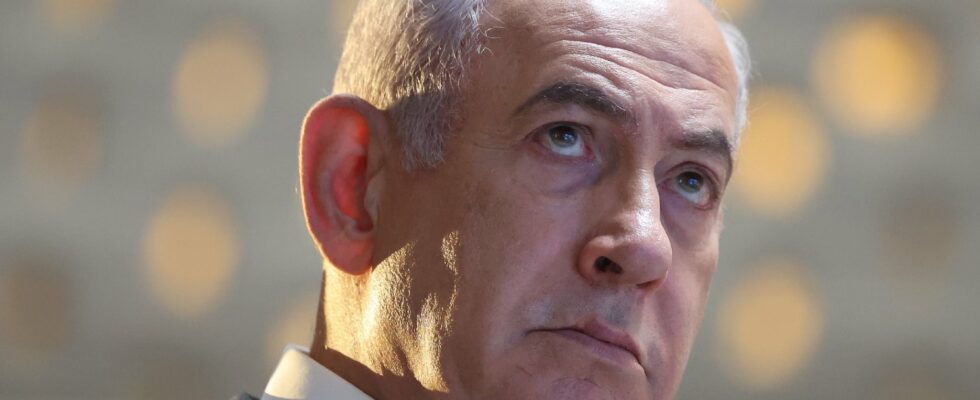There is the international scene. An increasingly pronounced exasperation with Benjamin Netanyahu. Of this seemingly endless war in Gaza, of the fear of (re)transforming Lebanon into a bloody theatre of war, of a generalized conflict against Iran that would plunge the Middle East and the entire world into a very dark future. “Gaza is a permanent nightmare that threatens to drag the entire region into chaos,” repeated UN chief Antonio Guterres at the podium on Tuesday. “A generalized war is in no one’s interest,” affirmed US President Joe Biden. “Nothing, no regional adventure, no private interest, no loyalty to any cause whatsoever deserves to trigger a conflict in Lebanon,” Emmanuel Macron wanted to warn.
In Israel too, it is an understatement to say that the fall in confidence in the Israeli Prime Minister had been strong after the attacks of October 7, and this patent failure of the Israeli government and intelligence to anticipate and prevent the most significant terrorist attack in history against the Hebrew State. This rout had been very concretely reflected in the polls: with 32 of the 120 seats in the current Knesset, “Bibi’s” party, the Likud, had fallen to a little over fifteen elected representatives if legislative elections were organized. A total break with Netanyahu who was already following his controversial reform of the Israeli justice system, and which seemed to definitively bury the Israeli Prime Minister.
“Netanyahu has definitely recovered from the post-war collapse”
But the reality at the UN is not the same as in Israel. And while internationally, the annoyance of Western leaders only seems to be increasing, in his country, the situation seems to be reversing. Thus, for several months, Benjamin Netanyahu’s popularity has been on the rise again. “Benyamin Netanyahu has definitely recovered from the post-war collapse,” he told the Financial Times Dahlia Scheindlin, political analyst and pollster in Israel. He seems to be taking advantage of Israel’s initiative and aggressiveness against its enemies in the region, including Iran and Hezbollah, despite the feared risk of a Middle East conflagration.
Israel’s increasingly aggressive action “at the regional level” has thus played a role in its rehabilitation, insists Dahlia Scheindlin to the FTwith the assassinations of some Hamas and Hezbollah leaders in Lebanon and Iran. “Netanyahu is losing credibility on Gaza because he too often promises ‘total victory’ and poll after poll shows that people believe his decisions are dictated by his political needs rather than the public interest. The rallying around the flag is much stronger when it comes to Hezbollah and the threat of escalation in the region,” she continues. Thus, according to polls conducted in the last two weeks, Likud would win more than twenty seats, which would once again make it the party with the most seats in a fractured Knesset.
A resurgence in popularity to be put into perspective?
So, would everything be forgotten? The hundred hostages still held in Gaza? The threat of reprisals from Hezbollah and Iran hanging over the inhabitants of northern Israel in particular. The situation is more complex than that. Starting with a reality: far from being adored in his country, “Bibi” benefits above all from the absence of a strong opposition that could embody a real alternative to power. Benny Gantz, his centrist rival, has lost popularity since his departure last June from the war cabinet formed after October 7. Yair Lapid, leader of the main opposition force, has also lost credibility since his express passage to the head of the Israeli government in 2022, and is also considered a less good option for the post of Prime Minister than Netanyahu in the latest polls.
Ultimately, the main opposition to Netanyahu seems to come from his own coalition. On one side, his Defense Minister Yoav Gallant, who no longer hides his irritation at the lack of an agreement in Gaza to free the hostages still held by Hamas. And on the other, the far-right ultra-Orthodox wing, which refuses to back down an inch on the war against Hamas or on illegal settlements in the West Bank.
Above all, even if “Bibi’s” Likud were to come out on top with around twenty deputies, it would remain far from the 61 seats needed to be able to govern. And it would remain even more of a prisoner of its alliance with the ultra-Orthodox far right, embodied by more than controversial and worrying figures such as Finance Minister Bezalel Smotrich or National Security Minister Itamar Ben Gvir. All the more so since facing it, no other political force currently seems capable of finding an alternative majority. In 2021, it took an alliance ranging from the Islamist party to the ultra-Orthodox Jews and various far-right parties to succeed in ousting Netanyahu from power. Suffice to say that this scenario has seemed very unlikely since October 7.
For the Israeli Prime Minister, one detail is also not insignificant: apart from dissolution and early voting, the next Israeli legislative elections are not due to be held until 2026. So many things can still happen between now and then, given the great uncertainty in which the entire region currently finds itself. His longer-term management of the war against Hamas and Hezbollah will thus be judged. But one thing is certain. Always announced as defeated, politically finished, Benjamin Netanyahu has systematically proven: he should never be buried too quickly.
